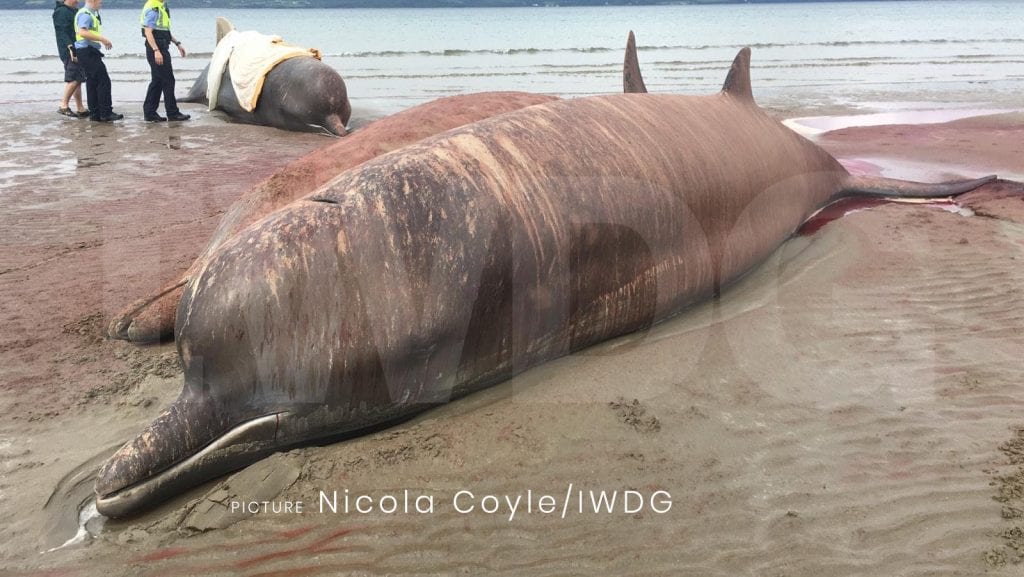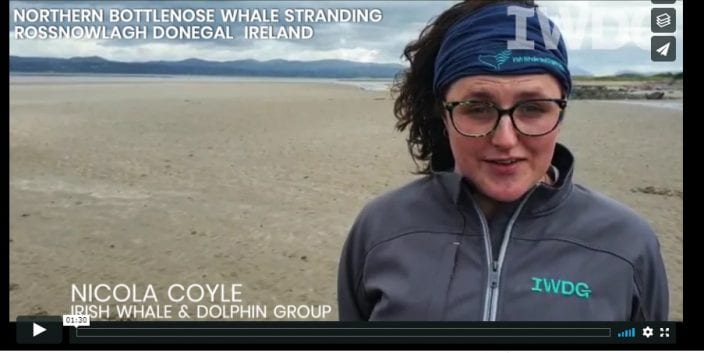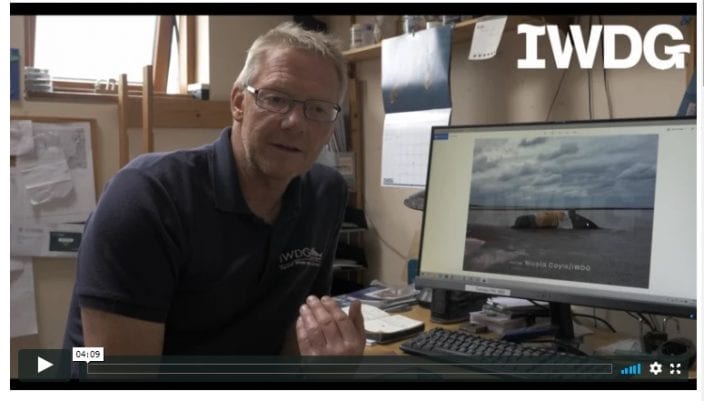The IWDG received a call on the morning of the 19th August to report a live stranding. Initially the animals were reported as bottlenose dolphins, but after we received a video from the beach at Rossnowlagh, Co Donegal from Thomas and Louise Coleman it was clear these were Northern bottlenose whales.
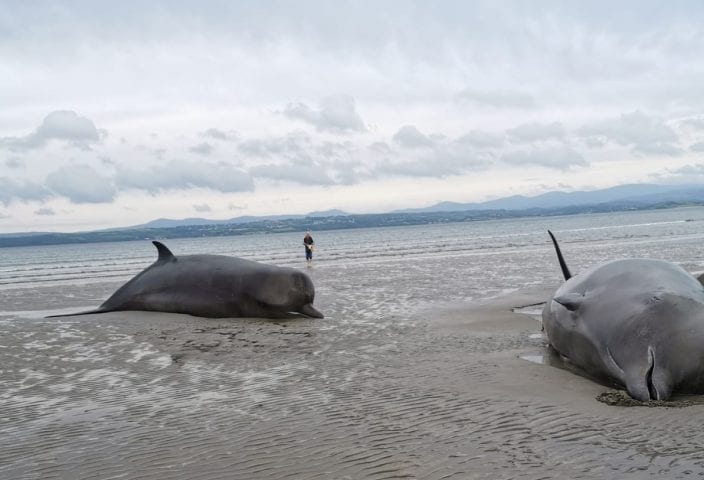
Northern bottlenose whales on Rossnowlagh beach Images by Louise and Thomas Coleman
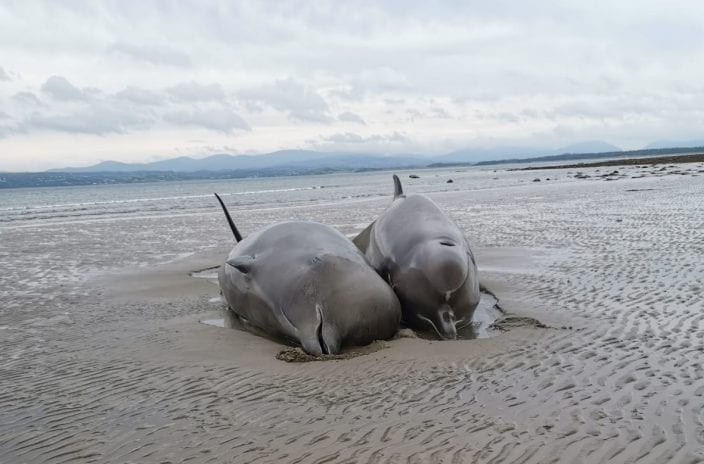
Northern bottlenose whales on Rossnowlagh beach Images by Louise and Thomas Coleman
Northern bottlenose whales (Hyperoodon ampullatus) are a deep-diving offshore species typically found in >2000m of water. The nearest habitat for these whales is over 100 nautical miles (200km) offshore and from the beach at Rossnowlagh where they were now stranded. After discussion with the National Parks and Wildlife Service and Donegal County Council, it was agreed that there was not a good case for re-floating these animals. Northern bottlenose whales can grow up to 9m and weigh 4-5 tonnes. The decision was made to provide palliative care and to aim to reduce as much stress and disturbance to the whales as possible.
First responder for the IWDG was Nicola Coyle. Nicola is a Donegal native and recently attended an IWDG Live Stranding course in January in Sligo. However, this was her first live stranding event. She arrived on the scene within 30 minutes of the IWDG taking the first call about the whales.
With support from the IWDG Head Office, Nicola was able to provide good advice and guidance to those on the beach and organise first aid for the whales that were beached but alive. Local DCO for the NPWS Tim Roderick was also soon on the scene as he was carrying out a seal survey nearby at the time and Donegal County Council were represented by Dave Friel.
IWDG updated information on the stranding through its social media channels to keep the public and media informed as the event and action to be taken. Interestingly, this solicited information from colleagues in Scotland who advised the IWDG of two similar live stranding events in the Faroes Islands around 17 August, and a recent sighting of two Northern bottlenose whales off Norfolk, UK in the North Sea. Clearly the stranding in Donegal might be part of a much wider event involving Northern bottlenose whales.
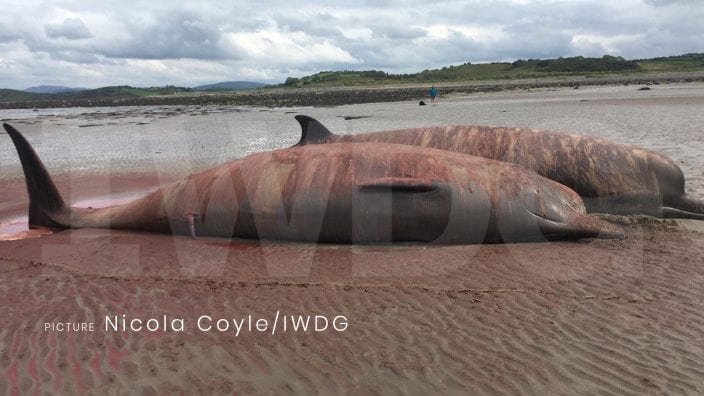
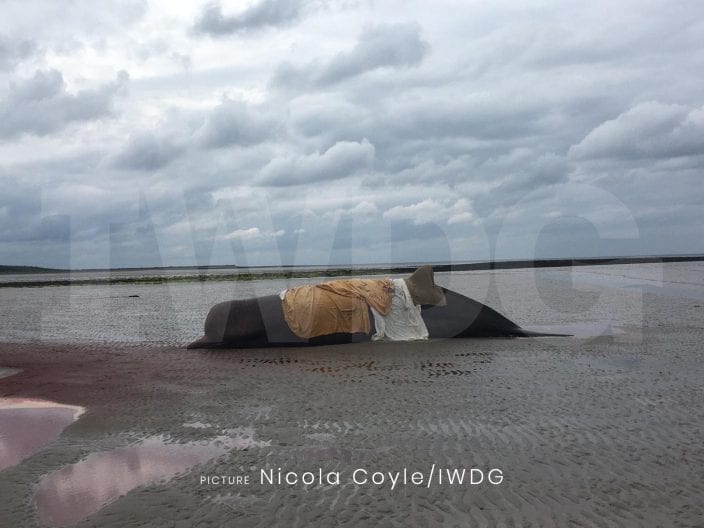
By the evening of the 19 August all but one of the whales were dead. One whale managed to re-float itself on the incoming tide and with the assistance from local surfers was re-positioned in the water. The surfers made an attempt to move the still alive whale off of rocks and onto the sand. From listening to IWDG members earlier on in the day the surfers knew they could not hope to successfully re-float this large animal but they said they “hoped to make it more comfortable by moving it off the rocks”. The IWDG did not advocate this course of action and the whale was found dead on the beach the following morning.
The following day an IWDG team from Kilrush travelled up to Rossnowlagh to try and learn as much as possible about the stranding and the life of these whales. With the assistance of Donegal County Council, Mags Daly, Simon Berrow, Sibéal Regan and Frances Bermingham took a suite of measurements, assessed age, gender and body condition and took samples for genetics and contaminants of 3 of the whales at Rossnowlagh. The tip of lower jaw was removed to access the teeth (embedded in the gum and not erupted in females and immature whales) for aging purposes.
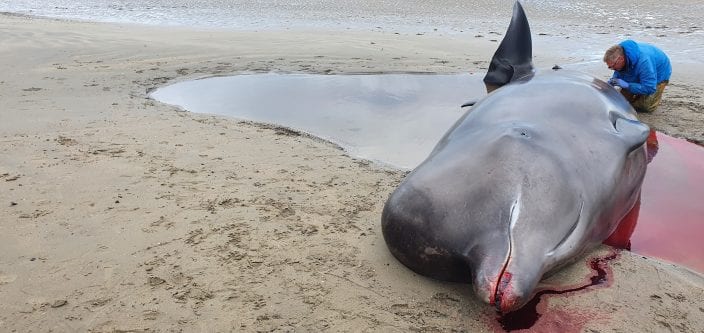
Image by Frances Bermingham
The other 4 had been spread around Donegal Bay with the tides. Over the next four days Mags Daly, Sibéal Regan and Nicola Coyle managed to eventually sample all 7 whales involved in this stranding. It will be interesting to see if this group are related. Are they are family group with strong social ties? Are these whales related to some of the other Northern bottlenose whales stranded in recent days.
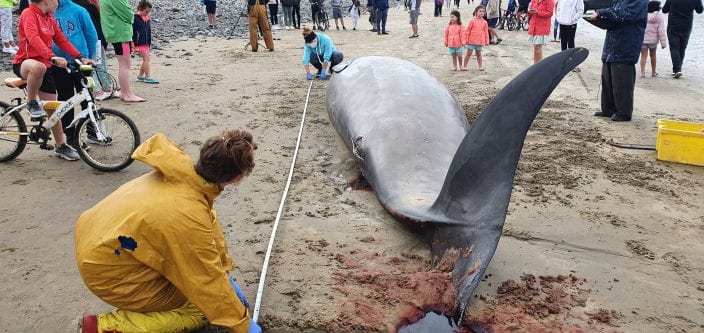
Image by Frances Bermingham
Part of a wider event?
The following day (20 August) images of two Northern bottlenose whales in Greenock harbour in the Clyde (west Scotland coast) were posted on social media and two more Northern bottlenose whales were sighted on 20-21 August very far inland in the Eastern Scheldt Estuary in the Netherlands.
This follows a spate of live strandings of Sowerby’s beaked whales, a related beaked whale species both in Ireland and the UK over the past few months. These are potentially unrelated but clearly something is happening to this group of whales we know so little about.
This live stranding event demonstrates the need for a response protocol so we in Ireland can react in a timely manner to these events. The IWDG as an NGO are typically on the front-line when these events happen and rely on the goodwill and support of people on the ground as well as agencies such as the NPWS and local authorities. In this case, we feel the response was rapid and appropriate with the inevitable outcome for the whales. They died quickly and with as little stress as we could provide on the beach. Samples were taken prior to removal and we will learn at little at least about these elusive, poorly understood whales.
The IWDG would like to thank Nicola Coyle for her commitment throughout this stranding event, Dave Friel (Donegal County Council) and Tim Roderick (NPWS) for assistance at the scene and all those concerned locals at Rossnowlagh who witnessed this sad event and provided great support to the IWDG and its team.
Dr Simon Berrow
For video and commentary on the event see IWDG Facebook and Twitter accounts
Media Coverage:
https://www.irishtimes.com/news/environment/seven-whales-beached-in-co-donegal-have-died-1.4334859
Further reading:
Two live stranding events in the Faroes:
Two Northern Bottlenose Whales sighted off Norfolk: https://www.greatyarmouthmercury.co.uk/news/whales-sighted-off-norfolk-coast-1-651328
Two Northern Bottlenose Whales sighted in Greenock harbour in the Clyde: (https://www.bbc.co.uk/news/av/uk-scotland-53883178/whales-spotted-swimming-in-greenock-harbour)
Two Northern Bottlenose Whales in the Eastern Scheldt, Netherlands: (https://www.tellerreport.com/news/2020-08-23-butskoppen-seen-in-oosterschelde–sos-dolfijn-looking-for-sightings.rJ50TBkemD.html.

